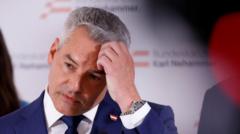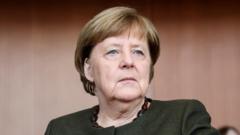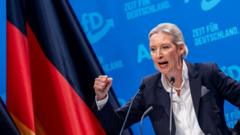The collapse of coalition talks in Austria could pave the way for new elections or a controversial alliance with the far-right Freedom Party.
Austria's Chancellor Karl Nehammer to Resign After Coalition Collapse

Austria's Chancellor Karl Nehammer to Resign After Coalition Collapse
Chancellor Nehammer announces imminent resignation as coalition-building efforts fail amid rising far-right influence.
In a startling political shift, Austria's Chancellor Karl Nehammer declared he will step down in the coming days as both head of the government and leader of the People's Party (ÖVP). This announcement comes after coalition negotiations with the Social Democrats broke down due to unresolved differences over critical policy issues. The liberal Neos party also withdrew from the discussions, exacerbating the situation.
The backdrop of this political turmoil includes the surprising success of the far-right Freedom Party (FPÖ) in September's general election, where they secured nearly 29% of the popular vote. Despite their electoral triumph, the other parties have categorically ruled out forming a coalition with the FPÖ, led by Herbert Kickl, further complicating governance in the country.
Political analysts suggest that the collapse of negotiations might set the stage for the ÖVP to reconsider an alliance with the FPÖ or possibly risk triggering new elections altogether. The FPÖ has made clear its dissatisfaction, highlighting that the stalled talks have resulted in three months of wasted time. In a recent statement, they called for the resignation of Social Democratic leader Andreas Babler and laid blame on President Alexander Van der Bellen for the ensuing chaos and instability.
This election cycle emphasized pressing issues for voters, namely migration, asylum policies, economic challenges, and the ongoing conflict in Ukraine. The FPÖ promised to enhance national security through its proposals, including stricter immigration rules and the controversial concept of remigration, which seeks to send asylum seekers back to their countries of origin.
The FPÖ, historically linked to controversial ideologies dating back to the post-World War II era, has seen a surge in support that may further destabilize the political landscape in Austria as negotiations falter.





















